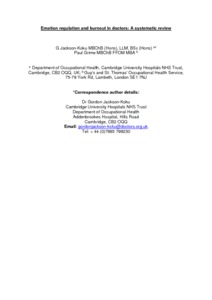Jackson-Koku, G; Grime, P
(2019)
Emotion regulation and burnout in doctors: a systematic review.
Occup Med (Lond), 69 (1).
pp. 9-21.
ISSN 1471-8405
https://doi.org/10.1093/occmed/kqz004
SGUL Authors: Jackson-Koku, Gordon
![[img]](https://openaccess.sgul.ac.uk/112284/7.hassmallThumbnailVersion/18-OP-197.R3-EDITS-SN%2C%20FINAL%20COPY%20OF%20ACCEPTED%20PAPER%2C%2008.01.2019%20v1.pdf)  Preview |
|
PDF
Accepted Version
Available under License ["licenses_description_publisher" not defined].
Download (443kB)
| Preview
|
Abstract
Background: Burnout is a pervasive health condition affecting many doctors at various stages in their careers. Characterized by emotional exhaustion, depersonalization, and a reduced sense of personal accomplishment it can result in significant personal and professional consequences putting patient care at risk. Emotion regulation describes a capacity to self-modulate emotions to achieve desirable emotional outcomes. Emotional intelligence theory suggests that emotion regulation skills facilitate the maintenance of appropriate emotions, reducing or adapting undesirable emotions in oneself and others. Emotion regulation is usually automatic but can be controlled through learnt strategies. There is evidence that occupationally stressed individuals are less capable of down-regulating negative emotions. This paper systematically reviews studies of the role of emotion regulation in burnout in doctors. Aims: To examine the relationship between emotion regulation and burnout among doctors. Methods: Four online databases (Psych Info 1833-2017, Medline 1928-2017, Scopus 1960-2017 and Embase 1974-2017) were searched in August 2017. Searches returned 15 539 citations, which after de-duplication yielded 12 295 citations. After title and abstracts screening 12 273 citations were excluded. Twenty-two full text articles were read and eight excluded for ineligibility. Following data extraction, bias and methodological quality assessment, findings were synthesized using descriptive analysis and presented according to relevant themes. Results: A correlative relationship was observed between emotion regulation and burnout in doctors. Findings also indicated that-using self-regulatory or taught emotion regulation skills or interventions such as mindfulness were associated with a reduction in burnout. Conclusion: Emotion regulation is an important psychological variable associated with burnout.
| Item Type: |
Article
|
| Additional Information: |
This is a pre-copyedited, author-produced version of an article accepted for publication in Occupational Medicine following peer review. The version of record G Jackson-Koku, P Grime, Emotion regulation and burnout in doctors: a systematic review, Occupational Medicine, Volume 69, Issue 1, January 2019, Pages 9–21 is available online at: https://doi.org/10.1093/occmed/kqz004
Correction available at https://doi.org/10.1093/occmed/kqz071 |
| Keywords: |
Burnout, Professional, Emotional Regulation, Humans, Occupational Stress, Physicians, Humans, Burnout, Professional, Physicians, Occupational Stress, Emotional Regulation, Burnout, doctors, emotion regulation, occupational stress, systematic review, 1117 Public Health and Health Services, Environmental & Occupational Health |
| SGUL Research Institute / Research Centre: |
Academic Structure > Population Health Research Institute (INPH) |
| Journal or Publication Title: |
Occup Med (Lond) |
| ISSN: |
1471-8405 |
| Language: |
eng |
| Dates: |
| Date | Event |
|---|
| 7 February 2019 | Published |
|
| Publisher License: |
Publisher's own licence |
| PubMed ID: |
30753715 |
| Web of Science ID: |
WOS:000463733300005 |
 |
Go to PubMed abstract |
| URI: |
https://openaccess.sgul.ac.uk/id/eprint/112284 |
| Publisher's version: |
https://doi.org/10.1093/occmed/kqz004 |
Statistics
Item downloaded times since 20 Aug 2020.
Actions (login required)
 |
Edit Item |



